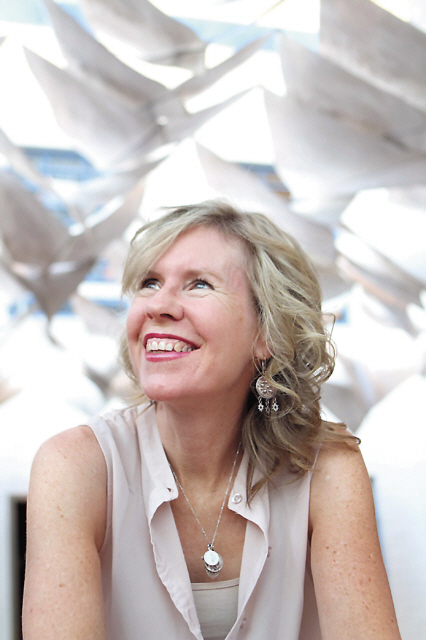Susan Straight lives mere blocks from where she was born in the Inland Empire town of Riverside. She says there are two types of people, those who stay and those who leave. Straight has always stayed.
“All I am is a writer and a mom,” says Straight, the author of eight novels, divorced mother of three daughters and a professor of creative writing at UC Riverside.
On a recent Monday afternoon, just a few days before the release of her latest novel, “Between Heaven and Here” (McSweeneys, $24), Straight feels she has failed at her second job by forgetting to pick up her 17-year-old daughter for an SAT prep class.
“I’m just a chauffeur and now I’ve blown my only assignment for the day,” says Straight, gripping her steering wheel and careening through heavy rush-hour traffic toward home.
She’s tardy because she was giving a tour of spots around town that served as inspiration for her new book. The alley where her protagonist, a beautiful, crack-addicted prostitute named Glorette, is found dead in a shopping cart. The sagging stucco apartment building where she imagined Glorette lived with her son, Victor, eating 10-for-$1 ramen. The orange groves where Glorette’s father and uncle live, their irrigation furrows glowing like silver stripes in the glaring late-day sun.
She also pointed out the small house she recently put an offer on with the hopes of opening a bookstore called Raincross Books. If her offer is accepted, she’ll segment the house as follows: the living room for fiction, a bedroom for nonfiction, a bedroom for children’s books, a room for used books and a small back room for baked goods.
“I think my community needs a bookstore,” says Straight, hopping up on a small brick wall surrounding bright pansies and peering into the front window of the empty house.
“All I am is a writer and a mom,” says Straight, the author of eight novels, divorced mother of three daughters and a professor of creative writing at UC Riverside.
On a recent Monday afternoon, just a few days before the release of her latest novel, “Between Heaven and Here” (McSweeneys, $24), Straight feels she has failed at her second job by forgetting to pick up her 17-year-old daughter for an SAT prep class.
“I’m just a chauffeur and now I’ve blown my only assignment for the day,” says Straight, gripping her steering wheel and careening through heavy rush-hour traffic toward home.
She’s tardy because she was giving a tour of spots around town that served as inspiration for her new book. The alley where her protagonist, a beautiful, crack-addicted prostitute named Glorette, is found dead in a shopping cart. The sagging stucco apartment building where she imagined Glorette lived with her son, Victor, eating 10-for-$1 ramen. The orange groves where Glorette’s father and uncle live, their irrigation furrows glowing like silver stripes in the glaring late-day sun.
She also pointed out the small house she recently put an offer on with the hopes of opening a bookstore called Raincross Books. If her offer is accepted, she’ll segment the house as follows: the living room for fiction, a bedroom for nonfiction, a bedroom for children’s books, a room for used books and a small back room for baked goods.
“I think my community needs a bookstore,” says Straight, hopping up on a small brick wall surrounding bright pansies and peering into the front window of the empty house.

Straight is a mile-a-minute talker, zeroing in on an idea with razor-sharp precision, articulating it quickly and moving on to the next with equal speed. She has spent the last 15 years writing about the same African American family in the fictional town of Rio Seco, based on Riverside.
“Between Heaven and Here,” which explores the aftermath of Glorette’s death and how it affects her friends and family, is the final book in a trilogy that includes “A Million Nightingales” and “Take One Candle Light a Room.” (Straight has published eight books since her first, “Aquaboogie,” in 1990.)
Her latest book is her first to be published by Dave Eggers’ McSweeney’s imprint. Straight says she chose to publish with him because “I loved their joyful, old-fashioned books ― books you can hold in your hands.” With its off-kilter dialogue and compelling universe of rich and troubled personalities, “Between Heaven and Here” fits into McSweeney’s vibrant catalog just fine.
The gripping, sometimes brutal book is filled with graceful details plucked from Straight’s observations of nature. She is a master of minutiae, pointing out the way the backs of sunflower petals look in the sunlight and how baby bees cling to a flower’s center or describing the way the fronds of a towering palm tree outside a kitchen window light up when the moon rises behind them so that the tree resembles a cosmic sparkler. This last detail is used to tear-inducing effect in “Between Heaven and Here.”
Straight’s characters are bound by this landscape and the gritty taco shops, stuffy nail salons and run-down laundromats that populate it. It is the landscape of her imagination made fertile by years of staying put and holding on.
“It’s the opposite of an exorcism,” Straight says of her writing. “An exorcism means you don’t have something with you anymore. When you spend 15 years writing three novels, you make that story and then you have it with you forever.”
The stories Straight writes are inspired by real-life events and people she just can’t get out of her mind. Like the pregnant black girl who was found dead in a shopping cart in Riverside in the 1990s, which inspired her vision of Glorette.
“She sat at the table in the taqueria for a few minutes, feeling blood move and growl in her feet,” Straight writes of Glorette in the book. “No socks. Sandals. Heels. The money not in her cleavage. No money yet tonight... Chess would give her money. But most of the men just slid a rock into her palm.”
“I don’t write about myself. I’m never in my books,” Straight says by way of explaining how she is so adept at tapping into the inner lives of impoverished African Americans. “I’m not there except for those little [natural] touches.”
Readers are often surprised to discover that Straight is white. She married an African American man when she was 22. They divorced more than a decade later but remain close friends, and they have three daughters.
“Their dad looks like a shorter Shaquille O’Neal and they are all really tall and really pretty. They are also all really bossy,” Straight laughs over crispy shrimp tacos from her favorite taco shop.
In addition to being a creature of habit, Straight is driven and prolific. She wrote all three books in the trilogy by hand on legal pads while sitting in her car in various parking lots, orange groves and parks. She did this to snatch time between teaching and driving her daughters to and from their various activities.
“They’d be watching skate videos at home and I’d say, ‘I’m going to the store,’ and I’d go and sit in a parking lot to write and then I’d get Baja fish tacos for everyone,” says Straight. “Then later at night I’d type it into the computer.”
Sometimes she’d have to wait until midnight to get use of the family computer.
“But look how lucky I was,” Straight says in her excitable way. “I got to process it before I put it down.”
By Jessica Gelt
(Los Angeles Times)



![[AtoZ Korean Mind] Does your job define who you are? Should it?](http://res.heraldm.com/phpwas/restmb_idxmake.php?idx=644&simg=/content/image/2024/05/06/20240506050099_0.jpg&u=)














![[K-pop's dilemma] Is Hybe-Ador conflict a case of growing pains?](http://res.heraldm.com/phpwas/restmb_idxmake.php?idx=642&simg=/content/image/2024/05/07/20240507050746_0.jpg&u=)